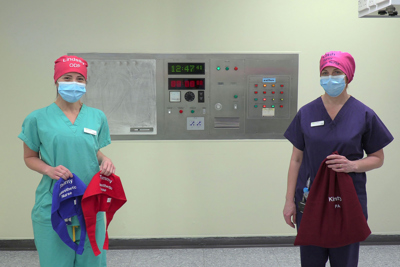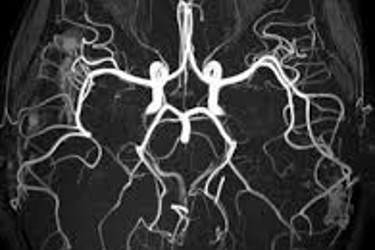
A simple innovation in Fife’s operating theatres is helping to improve communication between healthcare staff and patients.
Communication between clinical staff within operating theatres is vital. While the clinical theatre teams in Fife’s hospitals work closely together day-in day out, very often the surgeons carrying out planned procedures are specialists in a given field and may only work in particular theatres a few days each month.
The brainchild of Lindsay Quinn, an operating department practitioner based at Queen Margaret Hospital in Dunfermline, clinical staff working across all theatres in Fife’s hospitals have all been offered personalised theatre caps with their names and job titles adorning the front. This is helping to enable clinical staff working in theatres to see at a glance the names of those they are working alongside, and perhaps even more importantly, their individual role within the theatre team.
Furthermore, patients who may be disorientated and coming around after sedation can have the reassurance of being able to address the staff caring for them by name.
The initiative came about after Lindsay Quinn was tasked with carrying out a quality improvement exercise in her area as part of some additional study. After learning about similar initiatives elsewhere, she sought funding through the Fife Health Charity. Lindsay was successful in her application and was awarded £20,000 from the charity to fund the project.
In total around 450 staff working in Fife’s theatres have now been issued with personalised caps for use during operating procedures.
Lindsay Quinn said of the initiative:
“The project started out quite small and we intended just to try the idea in a single theatre. We quickly realised that a really simple little thing like this could benefit all the theatres in Fife and so it quickly grew from there.
“We’ve now provided caps to staff working in planned care, obstetrics, orthopaedics, all areas really, and as a clinical team I think you can really see how it improves communication, not only between staff but between ourselves and patients too. I think that’s really important as it’s an anxious time having surgery and so anything we can do to alleviate that anxiety is good for patients.
“On a personal level, it’s been a really satisfying project to be involved with. It’s taken a huge amount of work to get to this stage, from initially speaking with manufacturers to testing the caps to make sure they were suitable, to then gathering the details of the hundreds of staff working in theatres. It’s nice now to be able to see first-hand the benefits it is bringing, both for patients and staff.”
NHS Fife Director of Acute Services, Claire Dobson, added:
“Within the Health Service, we’re constantly looking at how we can adapt the way we are doing things, and very often this is focussed on large-scale service changes. Sometimes, however, it is small changes like the introduction of our theatre caps, which make all the difference to patients.
“People who are required to come in for surgery are naturally nervous and anything we can do to put patients at ease is welcomed. Simple innovations such as this really help makes the experience of patients that little bit easier.”
[ENDS]
Issued: 06 May 2021
Photos:
Captions:-
- Image 1: [L to R] Operating Department Practitioner, Lindsay Quinn, and Senior Charge Nurse, Catherine Jack, with a selection of the newly developed theatre caps.
- Images 2 - 5: Clinical staff in theatre wearing the new caps.
Video: [Download]
Audio:
- Operating Department Practitioner, Lindsay Quinn: [Download]
- Senior Charge Nurse, Catherine Jack: [Download]
